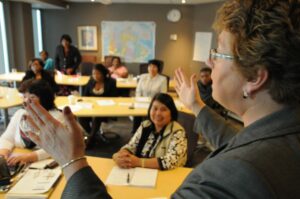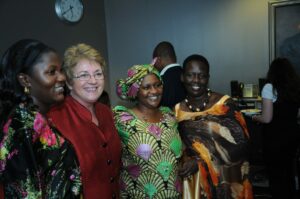
Bev Maxim
Bev Maxim has significantly contributed to shaping the Women’s Mentorship Program. We asked her to share her experience with the women participants, the training, her learnings, the impact to date, and what more we can do.
The Beginning
In 2002 I had the opportunity to volunteer on assignment in the Bahamas, to strengthen the cooperative system in a network of 16 credit unions. It’s where I felt I could make a difference in contributing my time and experience. A year later in 2003, I helped the women’s credit union in Mozambique.
The first time I went to Mozambique I was not sure how I could help but was relieved to find out that they needed only very basic knowledge of how to operate cooperatives. So I was able to share my knowledge from very early on in my career as a teller in a Saskatchewan-based credit union.
Beyond the Basics
Later we looked at some of their other challenges, such as loan delinquency rates, which were incredibly high at 60%. With only 40% of loans being repaid, the model would not be sustainable. I learned that culture was behind the high delinquency rate, as it was not customary to ask whether or not the borrow had the ability to repay the loan. They felt it was none of their business but quickly learned this approach had become a systemic issue and were open to working with me to create a more effective lending process. When I later heard that their loan delinquency rate dropped to an astoundingly low 2%, I felt we achieved tremendous success through our efforts of knowledge transfer and sharing of Canadian best practices.
Women’s Mentorship Program (WMP)
 I came into the WMP program in 2004 and started by layering on my volunteer experiences with CDF Canada. The program focused on credit-granting lending, which is a very important aspect of credit cooperatives. But still the question of what we could do to see even greater benefits remained. We asked ourselves what the benefit would be if we expanded the learning to include more technical skills and leadership skill development, given anyone – male or female – operating a financial institution or any other kind of cooperative, would need a broad range of skills to do that successfully.
I came into the WMP program in 2004 and started by layering on my volunteer experiences with CDF Canada. The program focused on credit-granting lending, which is a very important aspect of credit cooperatives. But still the question of what we could do to see even greater benefits remained. We asked ourselves what the benefit would be if we expanded the learning to include more technical skills and leadership skill development, given anyone – male or female – operating a financial institution or any other kind of cooperative, would need a broad range of skills to do that successfully.
This thinking paved the way for the next eight years, where I led classroom learning. As a result, we were able to incorporate new learning modules on strategic planning, human resource management, and the basics of financial and risk management, including the operation of deposit guarantee programs. We also incorporated modules on governance and leadership skill-building.
Impact of Course
The women participants I worked with over those eight years did not ever have the opportunity to talk about their work in their own countries. So this was, for me, one of the best outcomes of being able to do that and share and learn more about ourselves in terms of how we could do this better.
I think good learning for those of us in Canada is that there are varying levels of development of women in different countries. They come with different levels of knowledge, formal education, leadership abilities, and cooperative credit development, which is not ideal or conducive to a program that was originally built with a one size fit all approach. For example, organizations in Africa were at a different stage of development than the Philippines and had moved further along the development spectrum. Later, it became apparent that we needed to have some advanced courses.
A Hybrid Future of Classroom and Online
A huge benefit of the program had been the ability to have women from different countries around the world, all in the same physical space share thoughts and ideas, get to know one another, and bond. However, with the global pandemic not yet behind us, I think the ideal mix might be a hybrid of in-person and remote. If/when we are able to have in-person classrooms again and bring people from other countries to Canada, let’s do that. But also, let’s have an advanced program for those that need more advanced learning than, alongside a basic program. In other words, there could be two different kinds of women’s mentorship modules where one is for the progressive and the other more basic, with follow-up through ongoing online learning.
Currently, we give them this big deep dive of information in one month, and then we send them home and say “good luck”. I always felt that it would be much more effective if we could then follow up and say “alright, talk about what you’ve been able to do with this learning about your lending practices or your delinquency management or your human resource management.”
I’d love it if we could have smaller follow-up groups or perhaps even one-on-one mentoring. I think that that could be a beneficial way to follow up on the learning that they have had as part of the Canadian experience.
Changes So Far
The technical skills that cooperative leaders need are still the same in terms of the basics of operating and having sound operational practices. We have been able to accomplish this through the development ladder assessment tool that CDF Canada put together. This tool was very useful in terms of helping to focus on where to go from here, to develop cooperatives in many parts of the world.
What is Next?
 In my opinion, the next level of where CDF Canada needs to get to in terms of development and learning is risk management. That is how cooperatives will know how to control their risks.
In my opinion, the next level of where CDF Canada needs to get to in terms of development and learning is risk management. That is how cooperatives will know how to control their risks.
Based on my experience in Canada working with a large cooperative, I see that risk management is undoubtedly an area that they have to spend a lot of time managing because there are many risks facing an entity of that size. Essentially, the more successful and larger you get, the more time you will have to spend on risk management.
As volunteers, it would be good if we go to fields more prepared to assist them in overall effectiveness as volunteers. It would also be beneficial to enhance the approach to pre-assignment and pre-volunteer placement assessment, perhaps by developing a tool such as a development ladder assessment and guidebook to support them.
It’s the Women Make it all Worthwhile
I think one of my favorite experiences was the personal goal I set for myself to visit as many of the women as possible, that I worked with in the classroom in Canada, through the WMP. I visited as many of them as I could in their own countries, such as Ghana, Malawi, Uganda, Mongolia, and the Philippines. And when I am in those countries, I am able not only able to see the women but also to talk with some of the other cooperative leaders. It’s in speaking with them that I hear stories of such overwhelming recognition of the women returning from Canada. How do these women come back with tangible skills and confidence to take on leadership roles with the cooperative in their own countries. This was my greatest satisfaction and mission accomplished moment – knowing that we shared sufficient knowledge and tools with the women, to enable them to implement changes and effect positive change in their home countries.
One of my favorite, very powerful quotes from a Malawi participant, upon returning from Canada was this – “I came as Alina. I am going home as Alina with knowledge.”